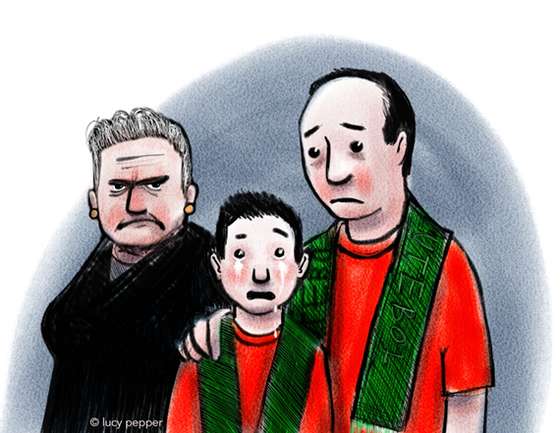Somos uma das grandes nações do futebol, os nossos jogadores estão entre os melhores do mundo… e no entanto não vamos ganhar o Mundial. É o que acontece sempre. Por um lado, ficamos cheios de esperanças, penduramos a bandeira à janela e no automóvel, pintamo-nos com as cores nacionais, cantamos “somos os campeões!!!!”. Por outro lado, sabemos que estamos destinados a perder, sentimos isso no segundo em que o avião com a nossa equipa aterra na terra do campeonato, sabemos que tudo vai acabar dolorosamente.
Mas de quem estou a falar? De Portugal ou da Inglaterra?
De ambos. É um dos traços que une os dois países: o fatalismo no futebol. Vamos ser eliminados, mas antes havemos de sofrer a agonia da esperança da maneira mais profunda. Antes de a equipa inglesa ter sequer tocado na bola, já corriam cartoons na imprensa com a mensagem “ser inglês é saber que voltaremos cedo para casa”. Os ingleses sabem que acabam sempre por perder nos penalties. Sempre. Até eu sei isso, e não ligo a futebol. Em geral, desprezo tudo o que tem a ver com futebol. Mas nas semanas do Mundial ou do Euro, sou a maior hipócrita do mundo, junto-me à festa, e desejo desesperadamente, futilmente, com todo o zelo nacionalista, que ganhe uma certa nação (Portugal ou a Inglaterra). No resto do tempo, porém, limito-me a olhar para vocês, os amantes do futebol. E vejo-vos a todos a sofrer.
O que mais me intriga no futebol é esse sofrimento auto-infligido.
Aqui em Portugal, nos últimos meses, com as finais de um campeonato ou outro, vi gente a pular de alegria nas ruas de Lisboa, mas vi também adultos muito, muito tristes, velhotas mais rabugentas do que o normal e crianças em lágrimas. O pior são as crianças em lágrimas.
Sim, vocês estão dispostos a meter a vossa felicidade nas mãos (aliás, nos pés) de onze tipos calçados com botas cor de laranja fluorescente (essa moda magoa os olhos, a cor de laranja não vai nada bem com o verde da relva), inteiramente fora do vosso controlo. Aqueles onze tipos vão ganhar ou perder o jogo, não por causa de vocês, mas dependendo do seu estado de espírito, das suas ansiedades, da temperatura, da humidade, do sol que bate ou não nos seus olhos, da equipa oposta, da sua forma física, dos seus talentos e, claro, da sorte.
Reconheço que há um pouco de tragédia grega nisto tudo. Percebo que quando as coisas correm bem, independentemente da ligação que se tem com uma equipa ser artificial ou mesmo ténue (e sejamos honestos, a “ligação” que a maioria das pessoas tem com uma equipa, para além da do seu país, é bastante ténue… como explicam a vossa afeição pelo Benfica e não pelo Sporting, ou pelo Man. City e não pelo Man. Utd.?), a sensação é fabulosa. É como ganhar uma batalha numa guerra, é como apaixonar-se, é como arranjar o emprego que sempre desejámos. Entendo que quando as coisas correm mal é como perder aquela batalha, perder aquele amor ou ser despedido — e não apreciamos os momentos altos sem passar pelos momentos baixos. Percebo isso.
O que não percebo é a razão por que, de livre vontade, nos sujeitamos a mais esta tragédia grega através do futebol. A vida já tem suficientes altos e baixos, batalhas, amores e realizações, ou não?
Oiço muita gente dizer que o futebol é uma religião. Não é. A fé religiosa consola e conforta quem a tem. O futebol não consola nem conforta. Não sei o que é, mas não é consolação e conforto o que vejo nessas imagens de adultos muito tristes, velhotas mais rabugentas do que o normal e crianças em lágrimas. E o pior, de facto, são as crianças em lágrimas.
(Tradução da autora)
The crying game.
Ours is a great footballing nation with some of the world’s greatest footballers…. and we’re going to get kicked out of the World Cup. It always happens. We fill ourselves with hope, we fly our nation’s flag from our windows and our cars and paint it on our faces, shouting “our nation is the greatest footballing nation in the world!!!” but really, we know we’re going to lose, we’re already telling ourselves this as our players touchdown in their aeroplanes, we know it will end in tears.
Wait, who am I talking about? England or Portugal?
Both. It’s one of our common traits: fatalism in football. We’re all going home, but first, let’s suffer the agony of hope in the deepest way we can. Before England even touched a ball, there were plenty of cartoons in the English press along the lines of “being English means knowing that we’re going to lose the football”. The English know that they will lose the whole thing on penalties. They always do. Even I know that and I don’t DO football. For most of the time, I bemoan everything about it. In the last two harrowing weeks of either the World Cup or the Euro, I get sucked in and become the biggest hypocrite in the world and join in with the jingoistic, futile, desperate wish for a nation to win (it can be Portugal or England, it doesn’t matter which). For the rest of the time, though, I am merely a spectator of all of you. I watch you all suffering.
The thing that mystifies me the most about football is this self-inflicted suffering.
Here in Portugal, the last couple of months, with the many finals of one championship or another, national and international, have been filled with images of, on one hand, joyously happy people, roaring through the streets of Lisbon and, on the other hand, grown men looking really, really sad, old ladies even grumpier than usual and little kids in tears. The little kids in tears are the worst.
You, yes you, willingly put your happiness in the hands (feet) of eleven people in fluorescent shoes (that fashion is hurting my eyes; the orange really clashes with the grass) who are entirely out of your control. Those eleven people will win or lose a game, not because of you, but depending on their mood, their anxieties, the temperature, the humidity, the sun being in their eyes, the opposing team, their fitness, their skills and, of course, luck.
I understand the Greek tragedy of it all. I get that when things go well, however artificial or tenuous your connection to a team (and let’s face it, most people’s “connection” to a team, other than that of their nation, is pretty tenuous… where does your affiliation to Benfica not Sporting, Man. City not Man. Utd., come from?), the feeling is amazing. It’s like winning a battle in a war, it’s like falling in love, it’s like getting the job you always wanted. I get that when things go badly it’s like losing that battle, losing that love or getting fired, and we don’t appreciate the highs when we don’t get the lows. I get that.
What I don’t get is why you subject yourself to it willingly. Life already has enough of those highs and lows, those battles and loves and achievements, already. No?
I hear any people saying that football is a religion. No, religion is a comfort to those who have it. Football isn’t a comfort. I don’t know what it is, but it’s not a comfort, going by the all those pictures of grown men looking really, really sad, old ladies even grumpier than usual and little kids in tears. The little kids in tears really are the worst.











